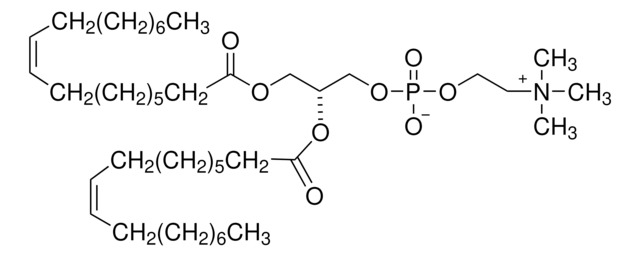880130P
Avanti
18:1 PEG2000 PE
Avanti Research™ - A Croda Brand 880130P, powder
Synonym(s):
1,2-dioleoyl-sn-glycero-3-phosphoethanolamine-N-[methoxy(polyethylene glycol)-2000] (ammonium salt)
About This Item
Recommended Products
form
powder
packaging
pkg of 1 × 1 g (880130P-1g)
pkg of 1 × 25 mg (880130P-25mg)
manufacturer/tradename
Avanti Research™ - A Croda Brand 880130P
shipped in
dry ice
storage temp.
−20°C
SMILES string
[H][C@@](COP([O-])(OCCNC(OCCOCCOCCOCCOCCOCCOCCOCCOCCOCCOCCOCCOCCOCCOCCOCCOCCOCCOCCOCCOCCOCCOCCOCCOCCOCCOCCOCCOCCOCCOCCOCCOCCOCCOCCOCCOCCOCCOCCOCCOCCOCCOCCOCCOCCOC)=O)=O)(OC(CCCCCCC/C=C\CCCCCCCC)=O)COC(CCCCCCC/C=C\CCCCCCCC)=O.[NH4+]
General description
Application
Packaging
Legal Information
also commonly purchased with this product
Storage Class Code
11 - Combustible Solids
Regulatory Listings
Regulatory Listings are mainly provided for chemical products. Only limited information can be provided here for non-chemical products. No entry means none of the components are listed. It is the user’s obligation to ensure the safe and legal use of the product.
JAN Code
880130P-25MG:
880130P-BULK:
880130P-1G:
880130P-VAR:
Certificates of Analysis (COA)
Search for Certificates of Analysis (COA) by entering the products Lot/Batch Number. Lot and Batch Numbers can be found on a product’s label following the words ‘Lot’ or ‘Batch’.
Already Own This Product?
Find documentation for the products that you have recently purchased in the Document Library.
Customers Also Viewed
Our team of scientists has experience in all areas of research including Life Science, Material Science, Chemical Synthesis, Chromatography, Analytical and many others.
Contact Technical Service










